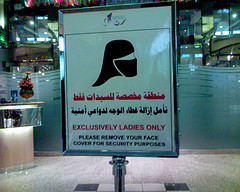 Das Netz ist schön dafür, dass alles vernetzt ist (sic!), dass es schnell geht, dass ich mitkriege, was geschieht (wenn ich will).
Das Netz ist schön dafür, dass alles vernetzt ist (sic!), dass es schnell geht, dass ich mitkriege, was geschieht (wenn ich will).
Haken: wenn alle voneinander oder den Agenturen abschreiben, spielen wir Stille Post.
Aktuelles Beispiel: die Meldung, dass Frauen aus Saudi-Arabien, die das Land verlassen, elektronisch an ihren Herrn und Gebieter verpetzt werden, der dann eine SMS kriegt. Grauenhaft auf allen Ebenen, keine Frage.
Geht überall rum, hat ja auch alles Potential: Überwachung, elektronisch, Frauenunterdrückung, irgendwo da unten.
Ist aber doch nicht ganz so, wenn dem Post auf Riyadh Bureau Glauben geschenkt werden kann:
Is the Saudi Government Monitoring Women?
An uproar broke out on Twitter last week when some Saudi women discovered that their male guardians began receiving text messages on their phones informing them that the women under their custody have left or entered the country.
Reporting on the uproar, AFP described it this way: “women in Saudi Arabia are now monitored by an electronic system that tracks any cross-border movements.” This description is inaccurate.
..
At first, I did not understand the uproar on Twitter because I thought this notification system has been in place for a couple of years now.
..
When I asked why the uproar now when this has been going on for at least a couple of years now, people told me that the difference is that in the past you had to register for the service to to receive the notification text messages. Now, they said, you get the messages even if you don’t register with the ministry.
This doesn’t make sense. How is it possible for the Ministry of Interior (MOI) to send you these messages if you don’t give them your number?
…
As you can see here, you opt for the service. If you don’t want to get the SMS notifications then simply don’t register with the ministry. If you registered and want to opt out, the TOCs say at the end that “Both, Subscriber and MOI have the right to end the subscription at any time without showing cause.” Opting out does not mean that your dependents would no longer need permission for travel, but rather that you would have to visit the passport office to issue the permit instead of doing that conveniently online.
Das ist auch alles nicht schön, in keinster Weise. Aber ein bisschen anders als: (nur) die saudischen Frauen kriegen neuerdings elektronische Fußfesseln.
Gehört auch zum echten Qualitätsjournalismus: nicht alles unbesehen abschreiben.
Disclaimer: ob das stimmt, was Riyadh Buereau schreibt, kann ich nicht beurteilen.
Bild: Flickr, CC-Lizenz, by Anduze traveller
Danke für den Hinweis. Immerhin interessant zu sehen, wie diese Vormundschaft praktisch abgewickelt wird.
„Haben wir schon immer so gemacht, was regt Ihr Euch jetzt auf?“ ist jetzt aber auch nicht wirklich die beste Verteidigung.
Sonst dürfte man Blackface bei Hallervorden auch nicht anprangern. Manchmal fallen Sachen auch später auf, dann ist es durchaus legitim darüber zu berichten und sich darüber aufzuregen.
Ahmed Al-Omran (Herausgeber von RB) zählt zu den profiliertesten Online-Köpfen Saudis. Abgesehen davon, als in Saudi-Arabien Lebender kann ich bestätigen was er schreibt.